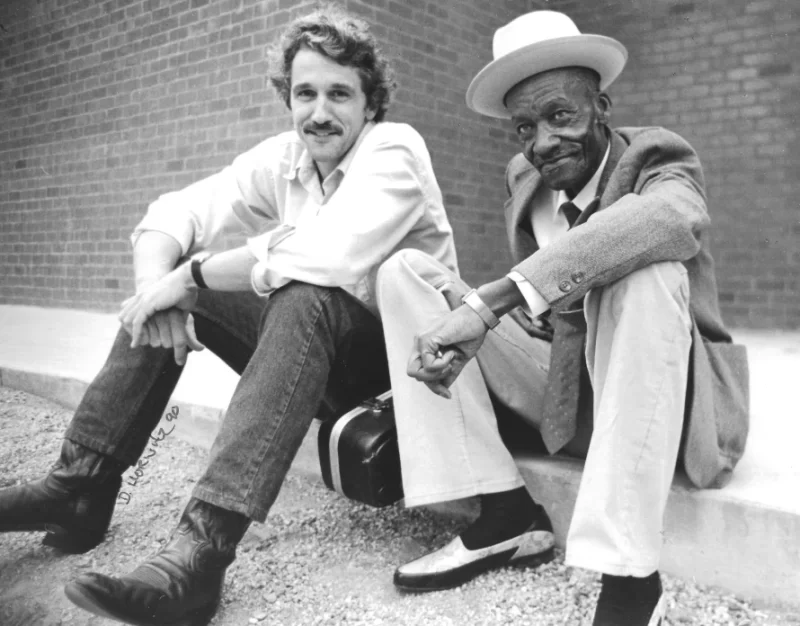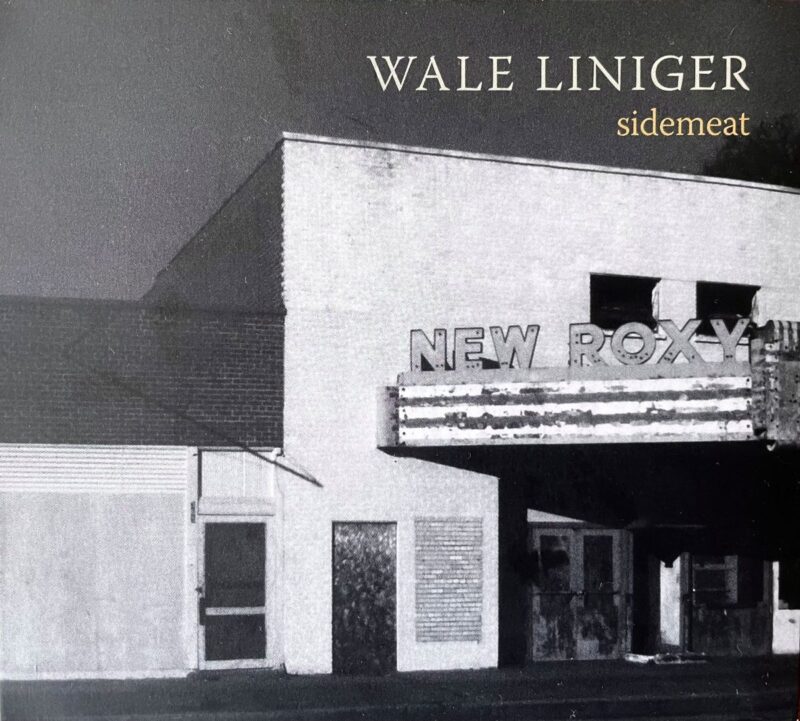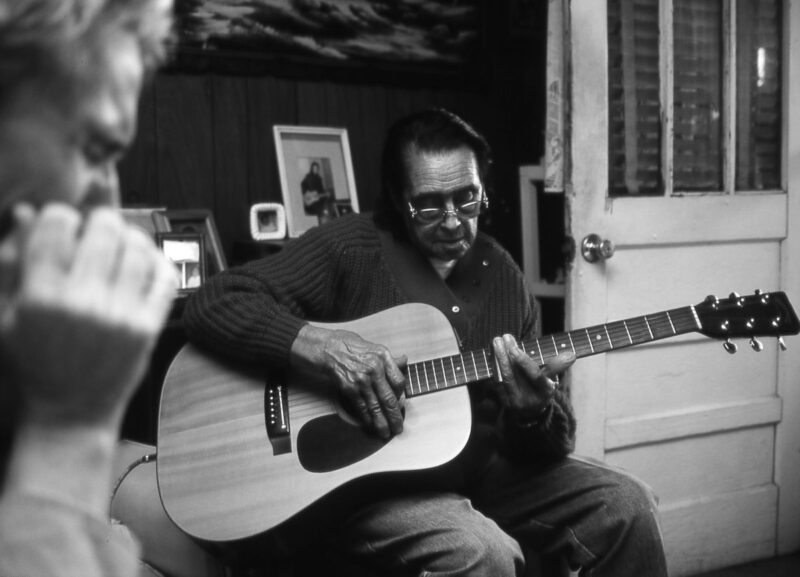By Frank Götz © 2025
Meet Walter Liniger (*1949), a Swiss-born musician and retired university professor who spent decades researching the blues. He’s hardly known in the States, even though he lived and worked in the Deep South for most of his adult life. His musical achievements have yet to be discovered, even though he played and recorded with known Mississippi artists. Even in Switzerland, where Liniger is probably known best, you’ll often find only myths and speculation, mostly because he had moved away. Well, he’s had his share of gigs, workshops and festivals, and nowadays, friends just call him “Wale” – pronounced “Wah-lə” – a childhood nickname Liniger carries with a youthful swagger.

It all began in his teens, when Walt heard his first blues records. Liniger cites two inspirations: the storytelling of Lightnin’ Hopkins, and the down-home tunes of Sonny Terry & Brownie McGhee. They simply rocked his world. Sonny Terry seems to have changed everything as the sounds and noises he made with his instrument gave Liniger a whole new outlook on music. “It was like he was talking to me, but without words”, Liniger recalls. “He was talking to ME. Not just anybody, but to me, personally, the aspiring blues harp player. From then on, I knew exactly what I wanted to sound like, what I wanted to achieve with music.” Since then, he has also become an accomplished guitar player, as anybody who has seen him live can confirm.
Liniger went on to become a language and history teacher. After graduating from the University of Bern, he taught for eight years in the Swiss public school system before he moved to the U.S. in 1982. It was time for a sabbatical, and after years of only playing as a hobby, he wanted to immerse himself in the blues. From 1984 until 1992, Liniger worked as a Research Associate at the University of Mississippi’s Blues Archive, directing the archive’s oral history project.

That’s where he met James “Son” Thomas (1926-1993), and during the following seven years, the duo appeared at many blues festivals in America and participated in the statewide Arts in Education program. Thomas wasn’t the only local musician he befriended in those years, but probably the most important one. Liniger calls him a “mentor” and “educator”, and he feels both lucky and honored to have been invited to play harp on two of the maestro’s albums. Check out Gateway to the Delta (1987) and Bottomlands (1990), where Liniger’s name and face even appear on the cover.
Another musician worth mentioning is Etta Baker, the magnificent Piedmont picker (1913-2006). They never did a whole album, but according to Walt, they played together frequently, and over the years their connection became very spiritual and, ultimately, a friendship. She’s featured on a blues anthology Liniger published in 2007, a collection of 12 songs and “musical outtakes” he recorded during his work at the Blues Archive in Oxford, MS. These performances are truly breathtaking, and according to the liner notes, it was Baker that gave the collection it’s title. To her, Liniger’s playing was “like sidemeat”, a remark the Swiss musician never forgot. “Knowing how much Etta enjoyed fried sidemeat”, he writes, “I took this to be a compliment, a term of endearment. After that, occasionally following a particularly interwoven tune, she would smile and call me ‘Sidemeat’.”
What makes this CD so remarkable, in other words, is the intimacy of the recordings and the fact that none of them, all done between 1987 and 1990, were made for commercial purposes.

This is country blues at its rural best, and the music offered here is so raw and pure that it’ll remind you of the classic field recordings. “I realize how passionately curious I was at that time”, Liniger adds, “wanting to learn as much as possible about a culture that eventually would remain alien, regardless of my desires. Each of the chosen tunes is a record of intimate moments, and of timely stumbles. Listening to them now brings back their stories intertwined with mine, echoes of playing ‘behind the main voice’.” If you want to own just one Liniger-album, this is the one to get.
Not only does it show a respectful, supportive and versatile musical sideman, it’s a labor of love with an impressive digest of Liniger’s memories and the legacy of one of Europe’s great blues devotees.
Thomas and Baker were Liniger’s inroad to the blues. They were his personal guides while entering the multifaceted culture of the American South. But the longer he did research there, the more he wanted to start teaching again. The years in Oxford had been a “valuable experience”, he explains on his homepage, but they were also “sobering and necessary” as they allowed him “to re-evaluate his rather intellectual notion of the Blues.” And so, he moved to the University of South Carolina, where in 1993 he found a teaching position. That was at the Institute for Southern Studies where he taught until his retirement in 2019. For 26 years, Liniger made his living as a “Distinguished Lecturer” for blues and blues culture – and apparently, he did it well.
The schoolteacher from Kehrsatz, Switzerland was now a colleague of renowned roots music scholars like Adam Gussow and David Evans. But when asked about his academic career, Liniger remains humble and states that for him, it was never about fame, fortune or accolades. It was about sharing “a cultural experience by exploring the underlying issues of translation and exile” – something, no doubt, he had become rather familiar with himself. Liniger is a firm believer of human creativity, and when teaching his students, he always looked for that common ground.
The essence of his courses and workshops is perhaps best described by a U.S. journalist Liniger cites on his homepage: Teaching blues culture means showing how the music “intertwines with and defines the spirit of the participants. In struggling with the contradiction of being a European on the outside looking in, for whom the blues was not his first language, he manages to create a stark and moving program of mostly originals steeped in the solo acoustic folk-blues idiom.”

Today, Liniger resides near Thun, about 45 minutes from where he was born and raised. He’s not on Facebook, or Instagram, or any of the social media platforms, but he does have a decent homepage where local fans and distant friends alike can keep track of his concert schedule. He doesn’t perform as often as he used to, but hey, the man’s pushing 80, even though he looks ten years younger – at least. Shy and elusive? A blues desperado? Not really. As far as he’s concerned, he’s just “flying under the radar”, enjoying retirement, and keeping his distance from an industry he was never actually a part of. We found Liniger to be warm and engaging, honest and wise, witty and generous, and very low-key. Oh, and don’t miss “Coming Home“, an hour-long documentary film about his life and career (2020, view below). It was done by Reto Camenisch, a well-known local photographer and longtime friend. It’s informative and beautiful and even offers subtitles for viewers abroad. Who knows, maybe – just maybe – some blues aficionados in the States will see it.
Thecountryblues visited the Swiss musician at his home in April and May 2025.
So, tell us, did you ever apply for a U.S. passport?
Of course. I’m a dual citizen. Have been for years. Owning two passports made travelling back & forth much easier.
You don’t travel anymore?
Not as much as I used to. I’m retired now.
You’re bilingual, you have two passports, and the countries you move between couldn’t be more different. What do you call home? Has anything changed in that respect?
Switzerland is where I was born, where friends and relatives live. It’s where I can talk in my mother tongue without constantly translating, although the local dialect has changed considerably. Lots of English nowadays and Eastern European slang. Migration has had an impact on this country, too.

America, on the other hand, was my home of choice, a place that allowed me to discover more about myself, a place that challenged me to learn what I needed to know. The fact that I moved back to my native country didn’t change a thing. As much as I was fascinated by the music, it wasn’t enough to absorb the culture. The harder I tried to belong, the more alienated I became. After all those years abroad, I now often feel like a stranger in my native country, too.
Any thoughts on Trump and the current situation in the U.S.?
American politics are omnipresent here, and having an American passport has consequences for my life in Switzerland. Yet despite all the stereotypes and clichés that surround the Deep South, I still miss the cultural richness and the humanity of the people I met…
Stage acquaintances, teaching buddies, cherished friends…
I have fond memories of spending time with other musicians, such as Andy Cohen and Eleanor Ellis whose continued interests stretched beyond the musical structures of the blues as well. And of course, there were Sparky and Rhonda Rucker whose knowledge and mastery of a wide variety of American voices helped me along the way.
What’s the most important lesson you learned from studying the blues? Tell us about the craft, the stuff you do, or don’t do, or try to do when performing.
“Son” Thomas always told me to sing in my own voice, and for years I was thinking: What the hell is he talking about? I mean, there I was, trying my hardest to sound like the masters, like the people and artists I most admired. But it’s not about the licks, or the chops, or anything blues people will talk to you about when explaining technique. It’s about sincerity and the emotive way you play your instrument. Took me a long time to understand that, especially as a singer.

And the reason is quite simple: That kind of expressiveness is the opposite of mimicry and emotionalism, of what the old Greeks called “páthos”. There’s nothing worse than a white blues singer trying to sound black – nobody believes a comic-book aesthetic. In other words, singing in your own voice not only includes my sympathetic resonance to a story, but above all my own experiences.
Sounds challenging. Did you ever find a voice? Your own voice?
I sure hope so! [laughs]
**************************
Liniger’s Official Website: https://www.bluesprof.com